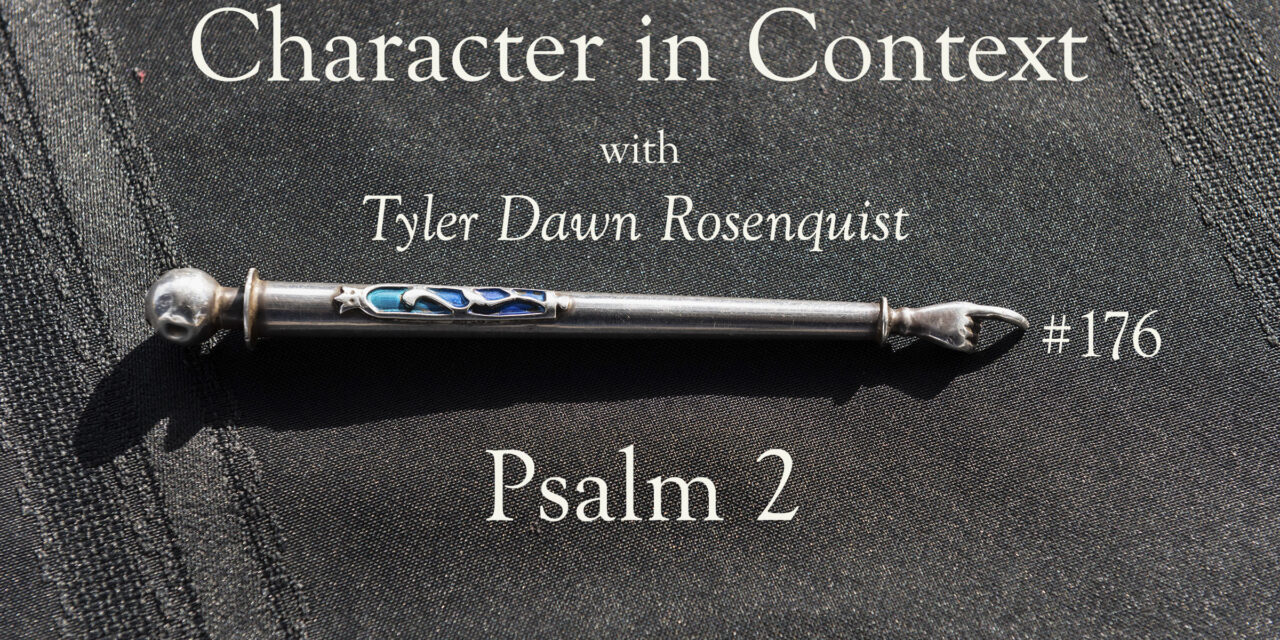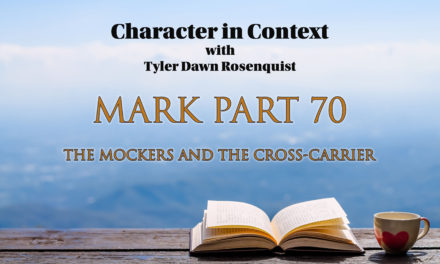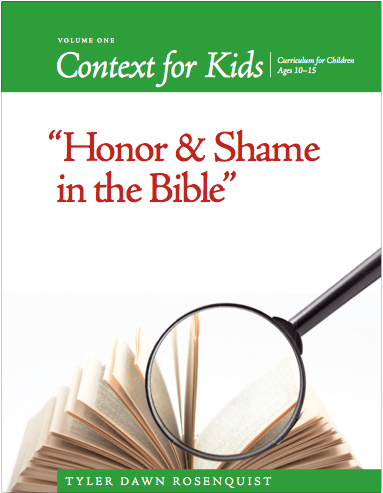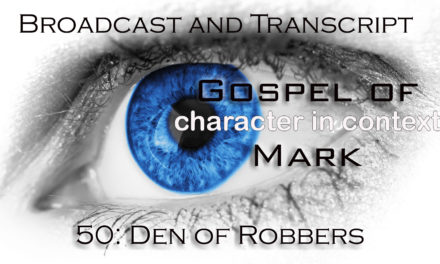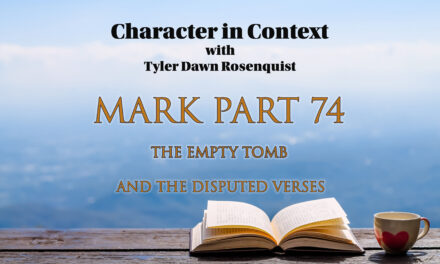Psalm 2 is one of the most famous “Messianic” psalms out there but it also pairs with Psalm 1 to teach the readers how to view the entire collection of hymns, laments, and royal tributes. How do Psalm1 and Psalm 2 work as a team in introducing the rest of the psalter? Why is it important for wisdom and kingship to dwell side by side in Covenant relations?
(My affiliate links for Amazon products are included in the post. As an Amazon Associate, I earn from qualifying purchases.)
If you can’t see the podcast player, click here.
If you would like to watch a slightly longer video version, click here.
Hey, there, this is the second week of my new series on the Psalms, and I will go back and forth every four episodes doing four Psalms and then four teachings on the Gospel of Matthew. I am doing this because they will help us read one another and especially when we get to the Beatitudes. Matthew presents Yeshua/Jesus as the Greater Moses, the giver of the wisdom of Yahweh and Israel’s definitive teacher whereas Moses was a lesser mediator who sometimes spoke his own words and did his own rock whacking—which got him into trouble. I will post a master book list sometime soon if you want to know what resources I am using for this series.
Hi, I am Tyler Dawn Rosenquist, and welcome to Character in Context, where I teach the historical and ancient sociological context of Scripture with an eye to developing the character of the Messiah. If you prefer written material, I have years’ worth of blogs at theancientbridge.com as well as my six books available on Amazon—including a four-volume curriculum series dedicated to teaching Scriptural context in a way that even kids can understand it, called Context for Kids (affiliate link). I also have two video channels on YouTube with free Bible teachings for adults and kids. You can find the links for those on my website. Past broadcasts of this program can be found at characterincontext.podbean.com, and transcripts for most broadcasts at theancientbridge.com. If you have kids, I also have a weekly broadcast where I teach them Bible context in a way that shows them why they can trust God and how He wants to have a relationship with them through the Messiah.
As we did last week, the Psalm itself will be read initially from Robert Alter’s excellent The Book of Psalms: A Translation with Commentary (affiliate link).. After that, I will pull all Scripture from the Christian Standard Bible (CSB). Alter is famous for his translations, which capture more of the flow and the brevity of the Hebrew. Sometimes it will make a big difference, as in this Psalm but with Psalm 1 we noticed that it didn’t really change much at all. And we can agree or disagree with his translation, and that’s okay too. I am kinda on the fence about this one and you will probably notice why right away—but his decisions aren’t entirely out of left field because each translator makes interpretational choices. Nothing is a true translation—that’s impossible. In order to communicate meaning, the text must also be interpreted.
Why are the nations aroused, and the peoples murmur vain things? Kings of the earth take their stand, and princes conspire together against the LORD and against His anointed. “Let us tear off their fetters, let us fling away their bonds!” He Who dwells in the heavens will laugh, the Master derides them. Then will He speak to them in His wrath, in His burning anger dismay them: “And I—I appointed My king on Zion, My holy mountain.” Let me tell as is due of the LORD. He said to me: “You are My son. I Myself today did beget you. Ask of me, and I shall give nations as your estate, and your holdings, the ends of the earth. You will smash them with a rod of iron, like a potter’s jar you will dash them.” And now, O you kings, pay mind, be chastened, you rulers of earth. Worship the LORD in fear, and exult in trembling. With purity be armed, lest He rage and you be lost on the way. For His wrath in a moment flares up. Happy, all who shelter in Him.
And we have mostly been taught to read this with a Messianic eye, right? This Psalm certainly was never fulfilled through David or any of his descendants, but that doesn’t mean that there isn’t a double meaning here that was in the mind of the original author. This might have been composed partially in response to some real-life crisis or just as a general ranting against foreign aggressors. I don’t believe that there are any purely predictive Psalms, but that each one made sense when it was written in some way or another that might be lost to history. Certainly, the Bible gives us a very narrow historical view. For the space of thousands of years, we are told relatively little and what we are told is related to us so that we can see God’s character. It is not a human history-centered document but a God-centered document. Sometimes we tend to forget it because we are naturally human centered in our own interests! But this Psalm is God’s story and not the story of any person—God is the main character despite there being three speakers/voices here working together. Do you remember when we studied Isaiah 40 and how many voices there were and how difficult that can be to unravel? Well, this one is much easier. According to Acts 4:26, the author/narrator is David inspired by the Holy Spirit in verses 1-3 and 10-12, and we have Yahweh’s reaction in verses 4-6, and the Anointed Son who is King in verses 7-9. Likely there is a lot more going on here than we will ever know.
For reasons I don’t have time to fully explore right now, there is a great deal of evidence that Psalms 1 and 2 were originally a matched set—maybe one Psalm instead of two. If you remember from last time, Psalm 1 is a wisdom saying, much as we would find in Proverbs or in the Beatitudes. It lays the foundation that the Psalms are to be experienced by the wise in order to grow in wisdom for the purpose of God’s people flourishing and the rest of the world also flourishing as a result (which will be an important thing to remember when we start our Matthew studies). But there is another side to the Psalms and that is the importance of the Kingship of God over His people. Even when speaking of David, David cannot be separated from God’s rulership because David only reigns through the allowance of Yahweh—this is why Psalms like this one are called Royal Psalms. Together, the wisdom focus and the kingship focus point us to the underlying foundation of Covenant relations. Covenant life with Yahweh must be lived out as an expression of both wisdom in knowing and learning and living according to His teachings or instructions (which is the proper translation of Torah) and recognizing Him as, fundamentally, the one true King of kings and Lord of lords.
These two Psalms set the stage for the rest of the collection, so we are to read every single one of them with these firmly in our minds. To read them apart from the lessons they teach can cause us to use them in some really wrong ways—along with the rest of Scripture, for that matter. Scripture, and the Psalms in particular, doesn’t give us the answer to every problem and question but it does teach us the wisdom we need in order to navigate life’s problems and questions. So, that was a really long introduction—let’s talk about the actual Psalm using the CSB.
Why do the nations rage* and the peoples plot* in vain? The kings of the earth take their stand, and the rulers conspire* together against the Lord and his Anointed One: “Let’s tear off their chains and throw their ropes off of us.”
We have our first speaker here, asking an important question. The tone is incredulous, meaning that the narrator can’t even believe these people can be so foolish. And this, of course, ties in with the wisdom theme. Wise nations do not rebel against the rulership or authority of Yahweh and/or His chosen leader. Note that this cannot be applied to church leaders, okay? Not the same thing. Man, have I seen this sort of thing misused. As far as the language goes, we have the goyim and the ummim—the goyim being the outside pagan nations and the ummim generally translated as “peoples” which can mean God’s people or the nations outside Israel and the clear context here is that these are foreign nations. What are they doing? Do you remember in Psalm 1 where the wise man mutters (translated as meditates but is also a verbal expression) the teachings of Yahweh all day long? Here in Psalm 2, we also see verbal reactions to Yahweh in the form of raging and muttering, but this time what they are doing doesn’t stem from or result in wisdom but is entirely in vain. This is classic ancient language for the actions of “fools.” Almost like the Tower of Babel, these people coming together to make a great name for themselves.
The ”kings of the earth” are taking a stand against Yahweh and His chosen king, and the word used is Maschiach aka anointed one, and the rulers are conspiring, another verbal action directly opposed to those who meditate/speak the instructions of God all day. And let’s talk really quick here about parallelisms. There are a few different kinds and it is commonly taught that they are all of the sentence A=sentence B sort of thing but that isn’t actually true. You can also have a sort of sentence A, and then “what’s more” sentence B, which adds to the concept of A. In this case, the second sentence elaborates on the first, saying the same sort of thing but being far more specific. The nations and the peoples aren’t simply grumbling but their leaders are also plotting and scheming and deciding to be opposed to Yahweh. They talk to one another about rebellion—but as we will see, they are all talk and no action. It sounds as though the nations see themselves as somehow vassals of Yahweh—why else would they be wearing a yoke or be bound? Yahweh’s response is very illuminating and yes, is supposed to be taken humorously. The Bible is a funny book.
The one enthroned in heaven laughs*; the Lord ridicules* them. Then he speaks* to them in his anger and terrifies them in his wrath: “I have installed my king on Zion, my holy mountain.”*
There are always people who take this sort of statement as proof that Yahweh is a mocker and so they can be jerks if they disagree with something but that isn’t what is being expressed here. We are looking here at incredulity. Imagine a toothless miniature dachshund with no claws bum-rushing you. I mean, it would be hilarious and we would all sit around laughing about it, right? We might even collectively pee our pants as he tries to gum you to death. But then, what would happen when it stopped being funny? “Bad dog! Cut that out!” And the dog would top and whimper and run off only to come back with its’ tail between its legs later. That’s the picture of these nations, peoples, kings, and rulers. Compared to Yahweh they are harmless rat-dogs. And here is Yahweh’s response, “Dudes, you are irrelevant, I chose my own king (not any of you) and I have placed him in authority in the place I have chosen in all the earth (not your countries) to be my set apart place.” Yahweh is setting the record straight and getting in their faces with the facts. They aren’t the kings of the mountain, or the castle, or whatever. They aren’t even in the running.
I will declare* the Lord’s decree. He said* to me, “You are my Son; today I have become your Father. Ask* of me, and I will make the nations your inheritance and the ends of the earth your possession. You will break them with an iron scepter; you will shatter them like pottery.”*
The chosen king, the maschiach, speaks and recounts Yahweh’s decree—His binding statement/promise/oath to the chosen one. “You are my son; today I become your Father.” This is ancient Near Eastern kingship/enthronement language. Most famously, Yahweh says this about Solomon in 2 Sam 7:11-16 “‘The Lord declares to you: The Lord himself will make a house for you. When your time comes and you rest with your ancestors, I will raise up after you your descendant, who will come from your body, and I will establish his kingdom. He is the one who will build a house for my name, and I will establish the throne of his kingdom forever. I will be his father, and he will be my son. When he does wrong, I will discipline him with a rod of men and blows from mortals. But my faithful love will never leave him as it did when I removed it from Saul, whom I removed from before you. Your house and kingdom will endure before me forever, and your throne will be established forever.’”
Figuratively, this is the language of gods to kings and queens, and it means “you are my chosen representative to bear my image before all of the people. When they see you it will be as though they are seeing me. It will be as if you are my own literal son. How they treat you is how they treat me but because of that, you will be held doubly responsible for how you treat my people because everything you do will be in My Name.” Sons in the ancient world were heirs and ambassadors—if you were a vassal serving the king, you owed the same loyalty, obedience and fealty to the son. They were in some ways one and the same and so transgression that makes the deity look bad had to be handled severely.
Now, all this sounds like it could have been written by David about himself or about Solomon, right? But now Yahweh is making promises that the nations will be the inheritance, even to the ends of the earth, of the mashiach, the anointed one, and that he will crush them with an iron scepter and shatter them as though they are clay pots. This certainly isn’t referring to David, or Solomon, or any of his descendants. This is eschatological language—meaning dealing with the end times. In fact, when the Davidic monarchy failed and all hopes for becoming a world power were dashed, the sages began seeing this as an end-times promise not for a mashiach like David but The Mashiach. The Messiah.
This verse is the only time that the word Son appears as a title in the Psalms. And the wording for “today I become your father” isn’t adoptive language but birthing language. Or rather, reproductive language. This is closer to the language used to speak of Adam and Eve than the language one would normally see describing ANE kings as the adopted offspring of the gods. This is a more primal sort of kingship than David enjoyed–the sort of pure image-bearing kingship enjoyed by man and woman in the Garden. And who is the “them” to be shattered and broken? Although there is the temptation to assume that this represents violent warfare, that isn’t necessary. As we see in Nebuchadnezzar’s vision, the Messiah is the one who violently shatters all the world powers/kingdoms of the Beast system—we see this in Daniel 7 and Rev 11, 12, and 19. Messiah frees people and destroys beast kingdoms—He doesn’t allow them to just be collateral damage.
Now, the speaker changes again to more of a narration. The rulers and kings have spoken, Yahweh has spoken, the Anointed one has spoken, and now the narrator returns to Psalm 1 style wisdom literature—he is going to tell the kings of the earth how to live wisely so that they and their people will flourish and prosper and not be destroyed:
So now, kings, be wise; receive instruction*, you judges of the earth. Serve the Lord with reverential awe and rejoice* with trembling. Pay homage to the Son or he will be angry and you will perish in your rebellion, for his anger may ignite at any moment. All who take refuge in him are happy.
Last line first—all who take refuge in Him are happy. Let’s review the first line of Psalm 1, “How happy is the one who does not walk in the advice of the wicked or stand in the pathway with sinners or sit in the company of mockers!” You see why scholars believe these two were originally one unit and meant to be read together? We have the “beatitude bookends” using the Hebrew word ashrei. Between these are the instructions for a life that will prosper—not financially but in terms of cooperating with God, blessing His Kingdom, and creating an environment of shalom or wholeness for all. When we behave with wisdom, we eliminate some of the chaos in the world and promote peace. We remove violence and create good fruit. We pursue justice and right wrongs. That is our goal as image-bearers, to be wise and build His Kingdom instead of our own. How are the kings advised on how to do this, as they are really being portrayed not only as fools but as the wicked, the sinners, and mockers of Psalm 1.
The kings are commanded to be wise, as opposed to the fools who oppose Yahweh and His Anointed One. The judges (and kings were the chief judges in the land in the ANE) are commanded to receive instruction—and although we might be tempted to believe that the word translated as instruction is Torah, this instruction is actually a word meaning correction and/or discipline. Yahweh isn’t condemning them, but the narrator is calling them into covenant obedience—really, into the Covenant. They are being summoned to serve Yahweh and to fear Him, as one does their King. These kings are being told that their deserved place is under Yahweh’s feet as conquered enemies but that they have the opportunity to be servants instead. Isn’t this the offer we were all made when we were kings and queens of our mini-universes? The mercies of the Lord are certainly new every morning, and as the sun is always rising somewhere, that means 24/7/365!
The kings are also commanded to rejoice with trembling, and this might seem odd, but isn’t it exactly what happened at Mt Sinai? The people rejoiced to know what Yahweh wanted from them and agreed to it before they even knew the details, but at the same time, they were terrified of the sound of His voice. So again, this is invitational Covenant language and not entirely adversarial. Yahweh is used to dealing with fools, especially since I was born!
Now, here’s the weird part where Alter and the CSB are at odds. Alter says, “With purity be armed, lest He rage and you be lost on the way.” The CSB gives us the more familiar, “Pay homage to the Son or he will be angry and you will perish in your rebellion, for his anger may ignite at any moment.” Although these seem wildly different, there are good arguments in support of both interpretations—because that’s what these are. There really isn’t an adequate word-for-word way to translate this and so scholars have to sort of guess at the meaning of the original author. Remember that one of Alter’s goals is to use as few words as possible in order to better reflect how the Psalm sounds in Hebrew, which is a very compact language, while English takes three times as long to say the same thing. What can I say, we’re a mouthy bunch! The important question isn’t, “Which one is right” but instead, “do either of these break with the overall meaning of Scripture?” And neither do. We can still find Messiah prophesied in Psalm 2 without the command to kiss or pay respect to the Son. It’s a nice cherry on top but not needed. If it is translated “with purity be armed,” is it really wrong? This Psalm isn’t entirely historical because it applies to no purely human descendant of David and to no era of Israel’s history either.
So, what if Alter is correct and this is telling them to arm themselves with purity (the ways of Yahweh/His correction/instruction) instead of arming themselves with words and weapons against Him? To me, this is a clever solution to a phrase that really doesn’t make all that much sense in the original Hebrew. It comes across as one last plea to these toothless, violent chihuahuas to go lay down and be good puppies.
Next week, Psalm 3, our first lament Psalm. I love the laments, as you will come to learn, and I hope you will as well.

